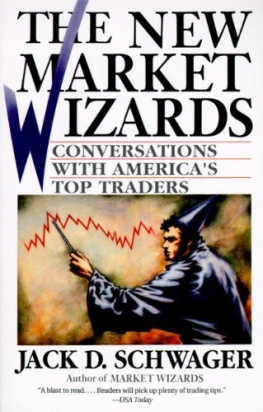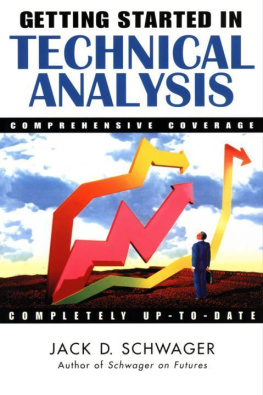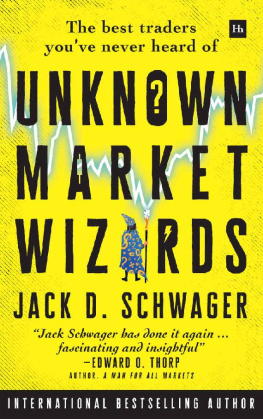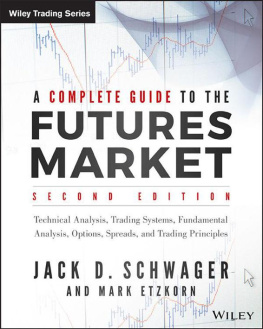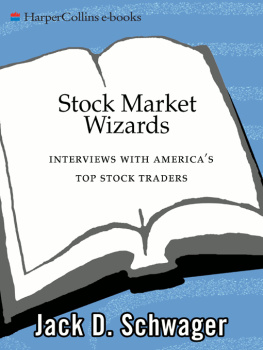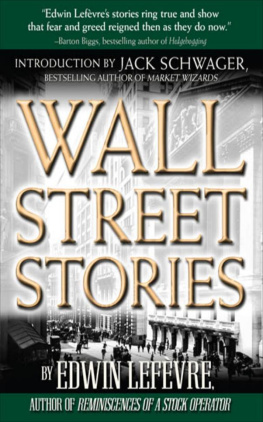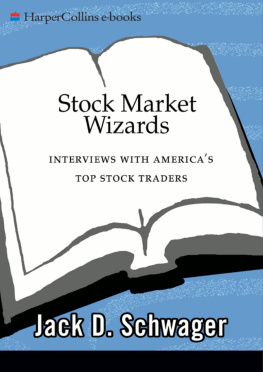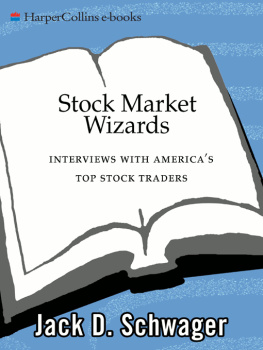Jack D. Schwager - The New Market Wizards: Conversations with America’s Top Traders
Here you can read online Jack D. Schwager - The New Market Wizards: Conversations with America’s Top Traders full text of the book (entire story) in english for free. Download pdf and epub, get meaning, cover and reviews about this ebook. year: 2009, publisher: HarperCollins, genre: Business. Description of the work, (preface) as well as reviews are available. Best literature library LitArk.com created for fans of good reading and offers a wide selection of genres:
Romance novel
Science fiction
Adventure
Detective
Science
History
Home and family
Prose
Art
Politics
Computer
Non-fiction
Religion
Business
Children
Humor
Choose a favorite category and find really read worthwhile books. Enjoy immersion in the world of imagination, feel the emotions of the characters or learn something new for yourself, make an fascinating discovery.
- Book:The New Market Wizards: Conversations with America’s Top Traders
- Author:
- Publisher:HarperCollins
- Genre:
- Year:2009
- Rating:3 / 5
- Favourites:Add to favourites
- Your mark:
- 60
- 1
- 2
- 3
- 4
- 5
The New Market Wizards: Conversations with America’s Top Traders: summary, description and annotation
We offer to read an annotation, description, summary or preface (depends on what the author of the book "The New Market Wizards: Conversations with America’s Top Traders" wrote himself). If you haven't found the necessary information about the book — write in the comments, we will try to find it.
The New Market Wizards: Conversations with America’s Top Traders — read online for free the complete book (whole text) full work
Below is the text of the book, divided by pages. System saving the place of the last page read, allows you to conveniently read the book "The New Market Wizards: Conversations with America’s Top Traders" online for free, without having to search again every time where you left off. Put a bookmark, and you can go to the page where you finished reading at any time.
Font size:
Interval:
Bookmark:
MARKET WIZARDS
CONVERSATIONS WITH
AMERICAS TOP TRADERS

TO MY FAMILY
Jo Ann
Daniel
Zachary
Samantha
Who are all very special to me
With love
More is learned from ones errors than from ones successes.
PRIMO LEVI
I must create a system or be enslaved by another mans.
WILLIAM BLAKE
H eres what I believe:
- The markets are not random. I dont care if the number of academicians who have argued the efficient market hypothesis would stretch to the moon and back if laid end to end; they are simply wrong.
- The markets are not random, because they are based on human behavior, and human behavior, especially mass behavior, is not random. It never has been, and it probably never will be.
- There is no holy grail or grand secret to the markets, but there are many patterns that can lead to profits.
- There are a million ways to make money in markets. The irony is that they are all very difficult to find.
- The markets are always changing, and they are always the same.
- The secret to success in the markets lies not in discovering some incredible indicator or elaborate theory; rather, it lies within each individual.
- To excel in trading requires a combination of talent and extremely hard work(surprise!) the same combination required for excellence in any field. Those seeking success by buying the latest $300 or even $3,000 system, or by following the latest hot tip, will never find the answer because they havent yet understood the question.
- Success in trading is a worthy goal, but it will be worthless if it is not accompanied by success in your life (and I use the word success here without monetary connotation).
In conducting the interviews for this book and its predecessor, Market Wizards, I became absolutely convinced that winning in the markets is a matter of skill and discipline, not luck. The magnitude and consistency of the winning track records compiled by many of those I interviewed simply defy chance. I believe the Market Wizards provide role models for what it takes to win in the markets. Those seeking quick fortunes should be discouraged at the onset.
I have strived to reach two audiences: the professionals who have staked careers in the markets or are serious students of the markets, and the lay readers who have a general interest in the financial markets and a curiosity about those who have won dramatically in an arena where the vast majority loses. In order to keep the book accessible to the layperson, I have tried to avoid particularly esoteric topics and have included explanations wherever appropriate. At the same time, I have strived to maintain all core ideas so that there would be no loss of meaningful information to those with a good working knowledge of the markets. I think this book should be as meaningful to the layperson as to the professional simply because the elements that determine success in trading are totally applicable to success in virtually any field or to achieving any meaningful goal.
The Jademaster
O ne cold winter morning a young man walks five miles through the snow. He knocks on the Jademasters door. The Jademaster answers with a broom in his hand.
Yes?
I want to learn about Jade.
Very well then, come in out of the cold.
They sit by the fire sipping hot green tea. The Jademaster presses a green stone deeply into the young mans hand and begins to talk about tree frogs. After a few minutes, the young man interrupts.
Excuse me, I am here to learn about Jade, not tree frogs.
The Jademaster takes the stone and tells the young man to go home and return in a week. The following week the young man returns. The Jademaster presses another green stone into the young mans hand and continues the story. Again, the young man interrupts. Again, the Jademaster sends him home. Weeks pass. The young man interrupts less and less. The young man also learns to brew the hot green tea, clean up the kitchen and sweep the floors. Spring comes.
One day, the young man observes, The stone I hold is not genuine Jade.
I lean back in my chair, savoring the story. My student interrupts.
OK. OK. Thats a great story. I dont see what it has to do with making money. I come to you to find out about the markets. I want to learn about the bulls and the bears, commodities, stocks, bonds, calls and options. I want to make big money. You tell me a fable about Jade. What is this? You
Thats all for now. Leave those price charts on the table. Come back next week.
Months pass. My student interrupts less and less as I continue the story of The Traders Window.
from The Traders Window,
ED SEYKOTA
O n the lecture tour following the completion of this books predecessor, Market Wizards, certain questions came up with reliable frequency. One common question was: Has your own trading improved dramatically now that youve just finished interviewing some of the worlds best traders? Although I had the advantage of having plenty of room for dramatic improvement in my trading, my response was a bit of a cop-out. Well, I would answer, I dont know. You see, at the moment, Im not trading.
While it may seem a bit heretical for the author of Market Wizards not to be trading, there was a perfectly good reason for my inaction. One of the cardinal rules about trading is (or should be): Dont trade when you cant afford to lose. In fact, there are few more certain ways of guaranteeing that you will lose than by trading money you cant afford to lose. If your trading capital is too important, you will be doomed to a number of fatal errors. You will miss out on some of the best trading opportunities because these are often the most risky. You will jump out of perfectly good positions prematurely on the first sign of adverse price movement only to then see the market go in the anticipated direction. You will be too quick to take the first bit of profit because of concern that the market will take it away from you. Ironically, overconcern about losing may even lead to staying with losing trades as fear triggers indecisiveness, much like a deer frozen in the glare of a cars headlights. In short, trading with scared money will lead to a host of negative emotions that will cloud decision making and virtually guarantee failure.
The completion of Market Wizards coincided with my having a house built. Perhaps somewhere out in this great country, there is someone who has actually built a house for what they thought it would cost. But I doubt it. When financing the building of a house, you find yourself repeatedly uttering that seemingly innocuous phrase, Oh, its only another $2,000. All those $2,000s add up, not to mention the much larger sums. One of our extravagances was an indoor swimming pool, and to help pay for this item I liquidated my commodity accountin the truest sense of the word. It was my sincerest intention not to resume trading until I felt I had adequate risk capital available, and an unending stream of improvements on the house kept pushing that date further into the future. In addition, working at a demanding full-time job and simultaneously writing a book is a draining experience. Trading requires energy, and I felt I needed time to recuperate without any additional strains. In short, I didnt want to trade.
This was the situation one day when, in reviewing my charts in the afternoon, I found myself with the firm conviction that the British pound was about to collapse. In the previous two weeks, the pound had moved straight down without even a hint of a technical rebound. After this sharp break, in the most recent week, the pound had settled into a narrow, sideways pattern. In my experience, this type of combined price action often leads to another price decline. Markets will often do whatever confounds the most traders. In this type of situation, many traders who have been long realize they have been wrong and are reconciled to liquidating a bad positionnot right away, of course, but on the first rebound. Other traders who have been waiting to go short realize that the train may have left without them. They too are waiting for any minor rebound as an opportunity to sell. The simple truth is that most traders cannot stand the thought of selling near a recent low, especially soon after a sharp break. Consequently, with everyone waiting to sell the first rally, the market never rallies.
Font size:
Interval:
Bookmark:
Similar books «The New Market Wizards: Conversations with America’s Top Traders»
Look at similar books to The New Market Wizards: Conversations with America’s Top Traders. We have selected literature similar in name and meaning in the hope of providing readers with more options to find new, interesting, not yet read works.
Discussion, reviews of the book The New Market Wizards: Conversations with America’s Top Traders and just readers' own opinions. Leave your comments, write what you think about the work, its meaning or the main characters. Specify what exactly you liked and what you didn't like, and why you think so.

